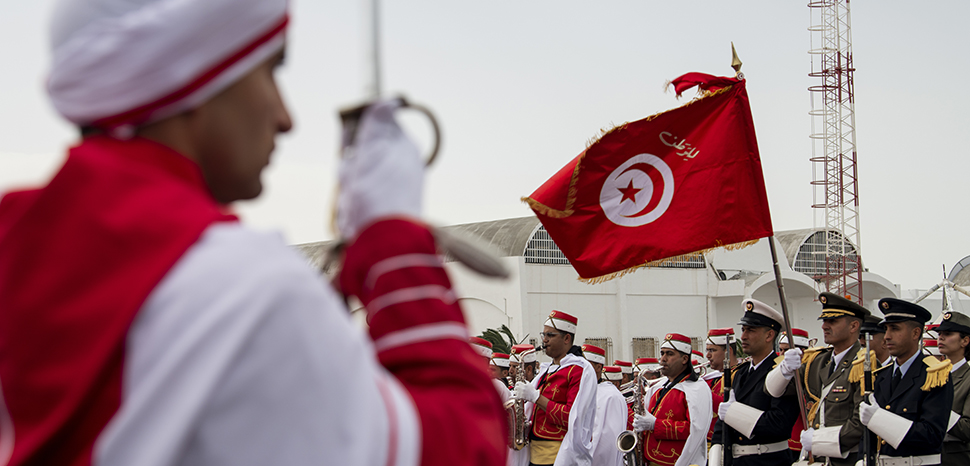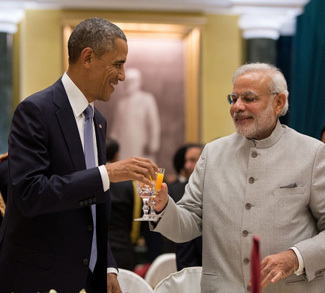As war engulfs the Middle East, the global stage is witnessing a Cold War-like resurgence. Amid the escalating Western-Eastern power rivalry, specifically the West versus Russia and China, ‘swing countries’ in the region are gaining significance. Historically aligned with the West, nations such as Tunisia and Libya hint at potential realignment with the East, raising critical questions about evolving partnerships and geopolitical balance. North Africa’s political disarray and local unpredictability create favorable conditions for Russian hegemony.
Let’s take the case of Tunisia. Kais Saied’s rise in Tunisia reflects the country’s post-2011 revolution struggles, signaling a shift from a promising economy to one on the fringes.
Tunisia signed a 10-year Road Map for Defense Cooperation in 2020, emphasizing the importance of the US relationship in North Africa and the Mediterranean. Successful implementation could serve as a model for negotiations with other nations in Africa and beyond.
Tunisia, eleven years removed from its 2011 revolution, faces challenges to its democratic journey amid political turmoil and economic uncertainties. Safeguarding Tunisia’s democratic transition is crucial, and the United States must also prevent potential alignment with Russia. This alignment could adversely impact European security, alter global power dynamics, and reshape 21st-century geopolitical strategies, underscoring the need to uphold Tunisia’s democratic stability.
The North African nation’s increasing swerve towards the East has diverse motivations, including the pursuit of economic opportunities, restructured security arrangements, and dissatisfaction with prevailing Western policies. Should Tunisia, a major non-NATO US ally and considered by the US as a security exporter, shift its alliances, it holds the potential to significantly impact global power dynamics, potentially reshaping geopolitical strategies in the 21st century.
Russia actively asserts influence in the Middle East and North Africa, aligning with Russian political scientist Fyodor Lukyanov’s views on the global importance of a strong position in the region. Russia’s strategic shift towards North Africa heightened after the 2014 Crimea annexation sanctions and persisted post-2022 Ukraine war. Relying on maritime exports, Russia must adapt to global energy market changes amid strained Euro-Atlantic relations for its future global standing.
For the past two decades, Russia has strategically fostered alliances with authoritarian regimes across various African regions, often at the expense of democratic institutions. President Vladimir Putin recently articulated his intent to formalize free trade agreements with a cluster of North African countries, signaling a proactive push towards economic collaboration. The move underscores Russia’s concerted effort to extend its economic footprint in North Africa and consolidate ties beyond mere political affiliations.
Russia’s interest extends beyond trade, as it contemplates the possibility of acquiring a permanent or contingency military base, including potential locations in Libya, Egypt, Algeria, and now Tunisia. These facilities would enhance Russian power projection into the Mediterranean and serve as a gateway to the African interior.
Meanwhile, growing dissatisfaction with European policies, exacerbated by issues like the migration crisis, fuels tensions and underscores the importance of understanding Tunisia’s evolving foreign relations and pursuit of new partnerships. The EU’s dependence on Tunisia for migration control provides its authoritarian leader with substantial negotiation leverage, implying that the West might tolerate governance abuses and overlook calls for economic reforms in exchange for ongoing financial aid.
If Tunisia’s attempt to join the BRICS could be seen as a desperate, albeit naive, effort to diversify its economy as well as a bargaining chip with the West, the rapprochement with Putin’s Russia is very real. Saied harbors ambitions to strengthen ties with the Kremlin by visiting Moscow, and he aims to extend these efforts to Beijing. His objective is to lessen Western influence, which he perceives as a hindrance to his exclusive control over Tunisian matters.
The U.S. and European allies are pivotal in stabilizing Tunisia and its region. U.S. leadership is crucial for countering Russian misinformation, especially in collaboration with major social media platforms like META, known for prioritizing government relations over citizen interests. Enhancing citizens’ awareness of their rights is vital for effective participatory governance, especially leading up to Tunisia’s 2024 presidential elections. Additionally, the U.S. should use its tech influence to support private sector growth and implement climate-smart energy reforms in the region.
In conclusion, the U.S. and its allies must empower pro-democracy forces, uphold democratic values, foster tech-forward and eco-conscious growth, and ensure international collaboration. As Tunisia nears the critical 2024 elections, partners’ commitment to citizens’ rights and countering disinformation is crucial. Maintaining robust Western alliances with Tunisia is key to prevent a zero-sum game where Russia would supplant U.S. and European influence in the North Africa region. Stabilizing Tunisia is not just of regional interest but crucial for international security and US interest.
Ghazi Ben Ahmed is the Founder and President of the Mediterranean Development Initiative.
The views expressed in this article belong to the authors alone and do not necessarily reflect those of Geopoliticalmonitor.com.




